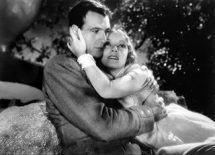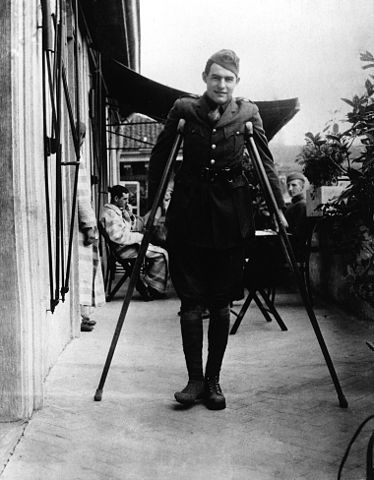A Farewell to Arms

(by Ernest Hemingway) (1929) –
His robust, muscular and terse style? Give us a break! This is his opening paragraph:
“In the late summer of that year we lived in a house in a village that looked across the river and the plain to the mountains. In the bed of the river there were pebbles and boulders, dry and white in the sun, and the water was clear and swiftly moving and blue in the channels. Troops went by the house and down the road and the dust they raised powdered the leaves of the trees. The trunks of the trees too were dusty and the leaves fell early that year and we saw the troops marching along the road and the dust rising and leaves, stirred by the breeze, falling and the soldiers marching and afterwards the road bare and white except for the leaves.”
We counted the word “and” 15 times.
No wonder he blew his brains out. The thing is, he must have been an incredibly good shot. A mannered one. J. B. Priestley felt that Hemingway’s ‘style’ “were like some magical coat of mail, not keeping its wearer active in the battle but preserving him from threatened collapse“,* which tells you a bit about Priestley.
James Wood has his own favourite of Hemingway at his worst in Farewell:
“He looked very dead. It was raining. I had liked him as well as anyone I ever knew.” His comment – “…there is a point beyond which pressurised shorthand is no longer an enrichment but an impoverishment, and an unnatural containment. It is the point at which ellipsis becomes a formalism, a kind of aestheticism, in which fiction is no longer presenting complexity but is in fact converting complexity into its own too-certain language.”**
As for complexity, we have an ambo falling in love with a cipher, a cardboard cut-out of an English nurse. All we know is that she is very pretty, and violently resists Henry’s charms, till she does so no longer.
According to his biographer, he started writing this thing after a head wound.^ It figures, and it shows.
There are some good bits, snappy dialogue and curious wanderings, redolent of Joyce’s Ulysses. This is done in the now familiar chatty patois of America’s lost generation. We have in mind the stream of consciousness that concludes book one, or random shots like:
“I tried to tell about the night and the difference between the night and the day and how the night was better unless the day was very clean and cold and I could not tell it; as I cannot tell it now.” (Indeed. A clear case of aphasia, they might say, and this even before the infliction of the wound.) You can see why J. D. Salinger couldn’t resist using the book as a joke in Franny and Zooey:
“I hate this rain. Sometime I see me dead in it.
My dear, isn’t that a line from A Farewell to Arms?”
[* J.B. Priestly, Literature and Western Man (1960), p. 435.] [**James Wood, The Irresponsible Self (2004), p. 238.] [^ A. E. Hotchner, Papa Hemingway (1968), p. 51.]Leave a comment...
While your email address is required to post a comment, it will NOT be published.



0 Comments